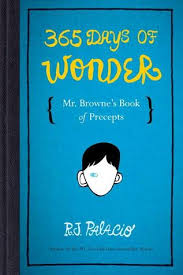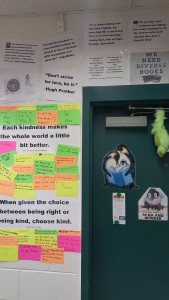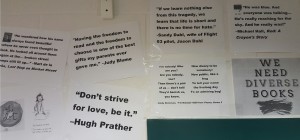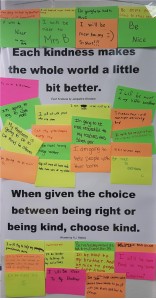In Wonder by R.J. Palacio, Mr. Browne assigns his students a precept monthly that they will discuss and write an essay about. He defines precepts as “rules about really important things.” Mr. Browne truly inspired me. He is one of those teachers in books that you read and wish you could work with them. Ever since I’d finished Wonder, I’ve wanted to do a precept activity in my class, so this year, I jumped in and do a (mostly) weekly precept.
On most Fridays, students enter my classroom to a precept projected on the board. They read the precept and immediately begin writing. What is the theme of the precept? Why did the author say/write it? What does the precept mean to your life? Does it make you want to change anything? I let them write for about ten minutes and then we begin discussing.
I love many different things about tackling precepts with my students.
First, it gives them time to think about life. Too often during the school day the curriculum is just that: curriculum. Students don’t often get to reflect and think about their own life.
Second, it hits on reading and writing! Students are thinking about theme, author’s point of view, author’s perspective, inferences, and more then are writing a reflection sharing these using evidence and specific examples.
Third, we have some amazing discussions after they read, reflect, and write. Anyone who is worried about the future hasn’t had a really good conversation with a 12-year-old.
Although I have used Mr. Browne’s precepts as an inspiration, I’ve gone a bit rogue from the 365 Days of Wonder book and even include picture books as part of our precept activity. I’ve tried to tie the precepts to our units and also to what is going on in the world like a quote from a 9/11 widow. Here are the precepts we did during the first semester with some students responses.
Picture Books
Each Kindness by Jacqueline Wilson
“Each kindness makes the whole world a little bit better.”
Students made vows of kindness that are posted around the precept.
The Dot by Peter H. Reynolds
“Just make a mark and see where it takes you.”
Student response: I feel like this book means a lot. First it means that you might think that your not good enough and that doesn’t mean that your bad it just means you need practice and practice makes perfect. Then I feel like when someone inspires you and gives you kindness you should pass it on. Lastly I feel like if you start little and then you practice and become big don’t forget how you started who inspired you and cut the kindness, you should be big and kind to the little ones or the ones who are just starting because you never know when you can be the cause of something big. I think that this book can help a lot of people even though it was a picture book and that’s why you shouldn’t judge a book by how big it is or its cover because a little amount of words can change someone’s life.
Red: A Crayon’s Story by Michael Hall
“He was blue. And everyone was talking…He’s really reaching for the sky. And he really was!”
Student response: “Don’t tell someone to be something they’re not. Let them discover who they are on their own.”
Last Stop on Market Street by Matt de la Peña
“He wondered how his nana always found beautiful where he never even though to look. He looked all around them again at the…broken streetlamps still lit up…”
Student response: Even if you are broken you can still shine brighter than others.
Poetry
“I’m Nobody! Who Are You?” (260) by Emily Dickinson
Student response: I think the theme of the poem is that being a person that tries to be in the pinnacle of attention is not how you will achieve happiness. To me this poem means that being yourself is the easiest source of happiness of life.
Precepts
“When given the choice between being right or being kind, choose kind.”
-Dr. Wayne Dyer, but found in Wonder by R.J. Palacio
Student response: We as people face choices everyday. Sometimes there easy, sometimes we don’t even realize we’re making one! This precept can be taken many different ways and all are correct. To me, this precept means love over opinion.
We Need Diverse Books
Student response: We need diverse books because when you read read the book and see all these races you think to yourself that its true,you look around you and you see the truth about the world. This is important because we need to be aware that all the people are different but they are all equal.
“If we learn nothing else form this tragedy, we learn that life is short and there is no time for hate.”
Sandy Dahl, wife of Flight 93 pilot, Jason Dahl
Student response: This precept means that life is shorter than you think and if you live your life hated someone, you will live your life with hate. Most of the time, when you hate, you are angry, that is why you will live your life filled with hatred for another person. I think the author meant that she has partially forgiven the terrorists because she does not want to love her life with hatred. Mrs. Dahl doesn’t want you to live a terrible life just because of some people. You want to live your life to the fullest. This precept means to me that you should not live a short life filled with hate, but a short life living joyfully, which will seem longer than it is. This precept makes me think of many things: the people that have done wrong to me, the terrorists, and 9/11.
“Having the freedom to read and the freedom to choose is one of the best gifts my parents ever gave me.”
Judy Blume
Student response: I think that this precept means that when you are given the freedom to choose which books you like it is really good because you can maybe relate to the book or learn from it. If you are deprived from books that you really enjoy, you might not even want to read at all because you want to read a certain type of book so much that any other book might not be fun to read. This is kind of like a movie you would want to watch. If you want to watch a movie for the right reasons, such as wanting to learn things or if it seems interesting, and you parents say you cannot watch it, other movies may not be that enjoyable because you are so set on watching a certain movie. You can also learn to be street smart smart from a book ahead of time so if you are in a situation, you have an idea of what to do. I think the author is happy that she was allowed to choose any book that she wanted because she might have learned something from books or maybe she gets very emotionally attached to certain books and she enjoys them very much. Maybe some people just read to go into a different world in their head because their family might be fighting or something. So, all in all the freedom of choosing whatever book you want to read is very important.
“Don’t strive for love, be it.”
Hugh Prather
Student response: I think the precept means that you should be the person to love not wait for someone to love you. Because if you wait you might never have love. And if you love you might get someone to love you back for who you are. Never be in the corner or in your room, always be out there to explore life and what it has to offer. Never give up who you like or what good qualities they have. Always stay true to yourself.
Precepts have given me a way to talk to my students about some tough subjects and get to know them better. Thank you R.J. Palacio and Mr. Browne for the inspiration!
Check out R.J. Palacios Nerdy Book Club post about Mr. Browne’s first precept
and her Tumblr post for a list of the Mr. Browne’s monthly precepts





What a beautiful and inspiring project, thank you for sharing this.
Thank you for stopping by! I love learning about my students.
I used Normal Norman as a precept on 3/4, and my students adored it. It starts a conversation on what normal is or actually how it is nothing.
Love this idea. Makes me think of how important books are to students’ identities, and the application of the ideas they can think of, and how to use them. The students’ responses have evidence of deep and critical thought! Lastly, I love the diverse range of texts your students are reading!
LOVE this idea and am going to borrow it! Many thanks!
Such a great idea, and such a great post. Perfect timing too – I just grabbed a copy of 365 Days of Wonder at a used book sale.
Article writing is also a excitement, if you
know afterward you can write or else it is difficult to write.